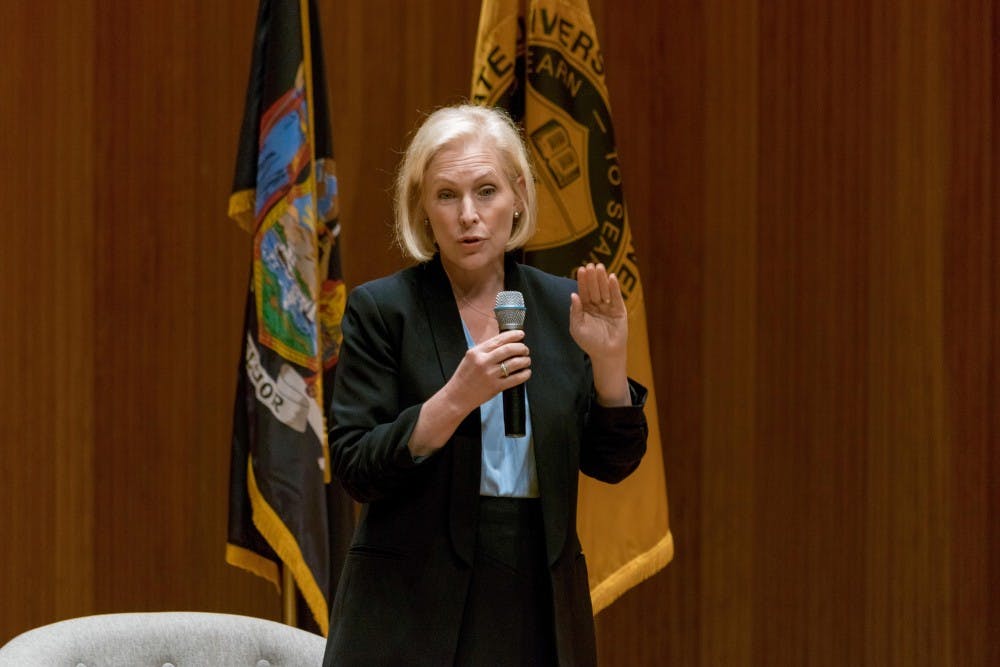Senator Kirsten Gillibrand (D-NY) discussed immigration, the U.S. economy and climate concerns during a town hall event at UB on Friday.
Gillibrand, who is running for re-election on Nov. 6, answered questions for roughly an hour at Slee Hall. Jean Wactawski-Wende, dean of the School of Public Health and Health Professions, moderated the town hall, but no attendee who asked questions identified themselves as a student.
Roughly 140 people attended the event. Wactawski-Wende selected audience members to speak via a random lottery draw.
Gillibrand began the event with a short address mentioning “all the work” UB President Satish Tripathi has done at UB and the Student Association’s efforts in helping to organize the event. SA posted about the event on Facebook, but not on its Twitter, Instagram or events calendar.
Gillibrand’s event seldomly centered on UB affairs, as mostly local residents asked about issues not pertaining to the university. Throughout, Gillibrand responded to a range of questions on state disability initiatives, urban transit, selective service and a Niagara Falls community youth center.
One audience member asked for Gillibrand’s take on healthcare reform and discussed the concept of “Medicare for All,” a universal healthcare proposal which calls for a government-run, single-payer system.
Gillibrand said healthcare costs are “spiraling out of control” and there are places where cost can be cut.
“I would get the insurance industry out of the process,” Gillibrand said. “I would create a not-for-profit public option, it doesn’t matter if it’s based on Medicare, Medicaid or something else.”
Gillibrand talked about the “trillions” of dollars Americans spend on health care, through co-pays, premiums and deductibles. She said ideally, anyone –– employers or not –– would provide health care so both employed and unemployed Americans can still access health care.
She said if you take the “power of the drug company” and the “power of the insurance company” out of the equation, Americans’ money would go directly to Medicare, which would lower the cost of healthcare and create “full transparency” for cost.
Another audience member asked about Buffalo’s West Side refugee and immigrant population and resettlement agencies working to integrate them into the community.
Gillibrand talked about how diversity was a strength, not a weakness, before launching into an attack of President Donald Trump’s immigration policy, which she said is “harming America” and “undermining the entire asylum process.”
Gillibrand said she blames the current immigration process for diminishing the reputation of the Immigration and Customs Enforcement. She said she believes the only way to combat this would be to “dissolve and reimagine” ICE altogether.
Other attendees quizzed Gillibrand on modes of para-transportation and housing for the disabled community. One attendee mentioned that with increased rents in the city, disabled people are unable to afford housing due to their low income. The attendee mentioned how peer-to-peer ridesharing companies, such as Uber and Lyft, offer limited accessibility to riders with disabilities.
Gillibrand responded, saying she plans to work with local representatives to get more money for housing specifically in Buffalo.
She went on to say that affordable housing is a grave problem across America and is aggravated by President Trump’s federal spending cuts on housing programs.
“There’s no community in America that needs more or little housing. But, getting rid of federal grants to provide housing to seniors, the disabled or low-income workers is a real problem,” she said.
Gillibrand also said she was troubled by the fact that Uber and Lyft provide limited access for disabled people.
Later, a resident –– who identified himself as a father of two –– asked Gillibrand to clarify her stance on marijuana legalization. He asked whether legalization would impact drug abuse among children.
Gillibrand said while she shared his worries and would not want her children to smoke marijuana, her support of decriminalization is different.
“The reason I support decriminalisation is because, unfortunately, marijuana laws are disproportionately enforced on people of color,” Gillibrand said. “It’s really egregious. In New York City, if you’re black or brown, you’re 10 times more likely to be arrested for possession than if you’re white.”
Others such as Jeffery Amplement, Niagara Frontier Transportation Authority’s assistant manager of grants and government affairs, asked Gillibrand about the future of the NFTA’s Amherst rail extension. He asked Gillibrand how federal money could help the project, which would extend into North Campus.
“We’re in the process of doing environmental reviews for what we refer to as the ‘locally preferred alternative’ to extend the train system forward, which will run through South Campus, through Amherst and over to North Campus,” Amplement said.
Gillibrand said she’s working in Washington, D.C. to increase transit funding amidst President Trump’s efforts to defund projects. Gillibrand said she supports the rail extension and intends to work with local leaders toward the project’s completion.
“The good news is that it’s a bipartisan issue. Most elected leaders in our state truly believe in transit dollars, back transit and funding transportation because it’s an economic growth engine,” Gillibrand said.
Charlie Baxter, a local resident, asked Gillibrand about the “top-tier issues” that Democrats should focus on and how to engage community members who aren’t politically active.
Gillibrand said the top three issues she cares about are education, healthcare and jobs. She said the more we focus on those three values, the Democrats will have a message that resonates everywhere and meets the needs of New Yorkers.
Baxter said he appreciates Gillibrand’s answer and understands her perspective.
“My interest in the communication of the Democratic party as a whole stems from the fact that so many people are inactive politically,” Baxter said.
“The Republican and Democratic voters combined don’t equal the number of eligible voters that don’t participate, so I was really interested in mostly her response in the means of increasing voter activity.”
Benjamin Blanchet is the senior features editor and Tanveen Vohra is a staff writer. Benjamin Blanchet can be reached at @BenjaminUBSpec on Twitter and both editors can be reached at features@ubspectrum.com.

Benjamin Blanchet is the senior engagement editor for The Spectrum. His words have been seen in The Buffalo News (Gusto) and The Sun newspapers of Western New York. Loves cryptoquip and double-doubles.
Tanveen Vohra is a former senior news editor and covered international relations and graduate student protests.






